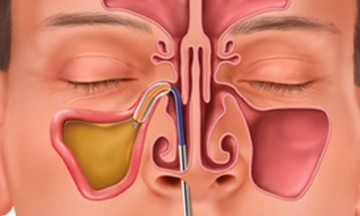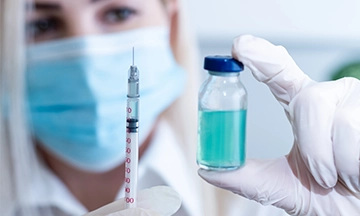
What should know about Sinuses & Sinusitis?
-
Sinuses are a connected systems of empty spaces in the facial bones, filled with air. They have different names, depending on their location: ethmoid, frontal, maxillary and sphenoid sinuses. Sinuses have a skin lining and a layer of mucus that filters and humidifies the air we breathe,
-
Sinusitis is an inflammation or swelling of the tissue lining the sinuses. But when they become blocked and filled with fluid, germs (bacteria, viruses, and fungi) can grow and cause an infection.
Conditions that can cause sinus blockage include the common cold, allergic rhinitis (swelling of the lining of the nose), nasal polyps (small growths in that lining), or a deviated septum (a shift in the nasal cavity).
Risk factors for Sinusitis
-
Swelling inside the nose caused by common cold or allergies
-
Deviation of the nasal septum
-
Nasal polyps
-
Conditions that make an infection more likely, such as immune system deficiencies or medications that suppress the immune system.
-
In children, the contributing factor for sinusitis includes allergies, illnesses from other kids at day care or school, pacifiers, drinking from a bottle as they lay on their back and smoke in the environment.
-
The main risk factors for adults are infections and smoking.
Symptoms of Sinusitis
-
A feeling of pain or fullness in your face- over the cheekbones, between or above the eyes
-
Nasal obstruction or blockage
-
Pus in the nasal cavity
-
Fever
-
Nasal discharge or discoloured postnasal drainage
-
You may also have, Headaches, Bad breath, Fatigue and Dental pain
How to diagnose sinusitis?
Having a history of the above symptoms are a strong indicator of sinusitis. During a medical screening, doctors may press your sinuses for tenderness, and tap your teeth to see if you have an inflamed paranasal sinus.
You may also need other tests like Nasal Endoscopy where we use a tubular camera to see inside your nose and sinus drainage areas.
Can Sinusitis cause any complications?
Though uncomfortable and painful, in most patients sinusitis is not dangerous. In some cases, the infection from the sinus can easily spread around the eye, the bones, blood or into the brain. The complications are more common among children, so if your child has swelling or redness of the eyelid or cheek, then it should be immediately reported to the doctor.
Surgical treatment for Sinusitis
FESS or endoscopic sinus surgery can be considered if antibiotics and other medicines don't clear the sinus.
An endoscope is used to visualize and widen the passageway of the sinuses. It is also used for cleaning out the mucus or pus and restoring the ventilation of all nasal sinuses. Most people can get back to their normal activities within 5 to 7 days.
Doctors may additionally do a procedure called “septoplasty” to straighten the nasal septum or "turbinectomy" to shrink the swollen tissues of the nose.
Newer Surgical treatment – Balloon Sinuplasty
A modern approach for treating sinusitis is a minimally invasive technique called Balloon Sinuplasty. In this process a balloon is placed over a wire catheter to dilate the sinus passageway. The idea is to restore the normal drainage in the sinus passageway. This opens up swollen, inflamed sinuses much like a heart surgeon opens blocked blood vessels to the heart with a balloon angioplasty.
Advantages of Balloon Sinuplasty
The Balloon Sinuplasty can be performed either in the hospital or at a doctor’s clinic considering how the procedure is relatively easy. Though performed under general anesthesia, it is slowly being performed under local anesthesia by many doctors
Computer Navigation Assisted Sinus Surgery
Computer Assisted Surgery is a new technology used during nasal and sinus procedures.
These systems use a computer specialized software, and electromagnetic tracking technology similar to a global positioning system (GPS) in a car, that allows the driver to see the exact location on a virtual roadmap. This tells us the exact position of the surgical instruments
Sinuses are irregular structures with a variable anatomy and in close proximity to the eyes, brain and multiple arteries and nerves. With the ability to track instruments, surgeons can more safely perform delicate procedures without damaging these critical surrounding structures. This helps surgeons to be accurate, thorough and safe.
What to expect after Sinus surgery?
-
It is normal to have some blood tinged discharge after sinus surgery
-
Straining or nose blowing soon after surgery
-
You will often be stated on a Nasal Saline Spray to moisturise & make your nose more comfortable.
-
You will be taught sinus which will clean out the debris left behind in your sinuses after surgery. This is important and improves results
Recovery after a Sinus Surgery
Immediately after surgery, most patients will find some improvement. Like any surgery though, the body takes a few weeks to heal completely. That’s when most patients will realise full improvement.

Dr. Honey Ashok
Senior Consultant - ENT, Head Neck Surgery & Head Neck Onco Surgery
Book Appointment With Dr. Honey Ashok,ENT Surgeon

Dr. Shantanu Tandon
Senior Consultant ENT & Head neck surgery
Book Appointment With Dr. Shantanu Tandon,ENT

Dr. Dali Chandran
Attending Consultant - ENT and Head Neck surgery

Dr. Divya .B
Attending Consultant - ENT and Head Neck surgery


















